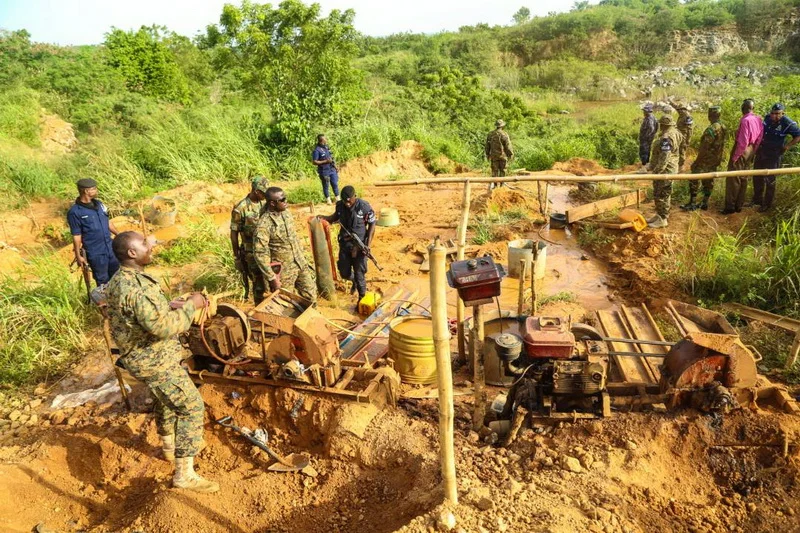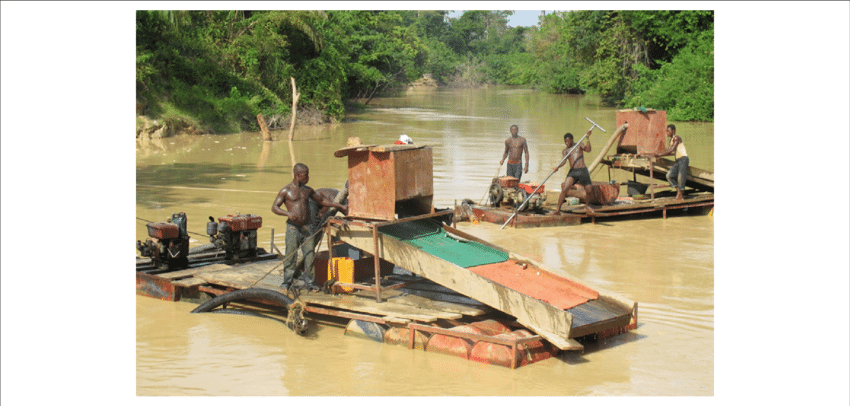Illegal mining, or galamsey, has been a growing concern in Ghana for decades. This destructive practice has devastated large swaths of the environment, contaminating rivers, degrading farmlands, and leaving communities grappling with pollution and other serious consequences.
In an effort to curb the spread of this illegal activity, the government, under President Nana Addo Dankwa Akufo-Addo, has once again launched military interventions, including “Operation Halt,” a strategy aimed at combating galamsey by deploying soldiers to the affected areas. However, concerns remain about the sustainability and long-term effectiveness of using military intervention to fight galamsey.
Mr. Richard Kumadoe, a security consultant and fraud prevention expert, shared his insights in an interview with the Vaultz News. According to Mr. Kumadoe, the military is indeed equipped to handle illegal mining operations, as it falls under their mandate to protect national sovereignty.
“National threats fall directly under the operations of the military. if you are taking illegal mining or ‘galamsey’ as a national security threat, then it’s one of the things they have been trained to deal with.”
Mr. Richard Kumadoe, Security Consultant and Fraud Prevention Expert
However, he emphasized that the key to success lies not just in deployment, but in providing the necessary resources and tools.
“The military has the capacity and training to deal with illegal mining. What is disturbing is not giving them the right tools and the right resources to enable them to do an effective job.”
Mr. Richard Kumadoe, Security Consultant and Fraud Prevention Expert
Without these essential tools, sending the military to address galamsey operations may prove futile, as demonstrated by past deployments.
“The military has been there before, and they did not get the job done,” Mr. Kumadoe observed. This raises critical questions: will the military employ new methodologies this time around? Will they have access to better equipment that allows for effective mapping of galamsey sites? Will they have the mobility and firepower necessary to neutralize illegal miners, many of whom operate in remote, hard-to-reach areas?
The lack of specialized equipment is especially concerning given the geographical spread and hidden nature of many illegal mining operations.
“If the military is to root out galamsey in all its forms, they need advanced tools for mapping, aerial surveillance, and mobility, not to mention proper weapons for self-defense in hostile environments.
“Without these resources, the soldiers might only manage to disrupt mining activities temporarily, rather than bring about lasting change.”
Mr. Richard Kumadoe, Security Consultant and Fraud Prevention Expert
Moreover, the burning of equipment used by illegal miners—while symbolic—has sparked controversy. As Mr. Kumadoe pointed out, people want to know who owns the equipment being destroyed and whether legal processes are being followed to address the ownership and accountability issues. Without clear communication and transparency, the military risks losing credibility among the population, which could undermine the entire operation.
Political Interference and Lack of Clear Strategy

Another significant hurdle to the military’s involvement is political interference, which can undermine the success of operations. “Political interference and the lack of a clear, instructive regime that outlines specific goals for the military can derail the mission,” according to Mr. Kumadoe.
The military needs precise instructions and should be given free rein to execute its mandate without being hampered by political considerations.
In past interventions, political pressures have hampered the effectiveness of military operations, making it difficult for soldiers to execute their duties impartially.
Mr. Kumadoe’s point about giving the military clear instructions is crucial. If the military’s mission is clouded by vague directives or shifting political interests, the soldiers on the ground will not be able to focus on the task at hand.
Furthermore, he noted that without autonomy, the military’s actions might be perceived as a political tool, which could erode public trust in both the military and the government’s commitment to addressing galamsey.
Risk of Escalation and Casualties
The use of the military in civilian settings such as mining pits also raises concerns about potential casualties. When military personnel are deployed in areas where illegal miners operate, tensions can escalate, leading to violent confrontations.
Mr. Kumadoe warned that communities near galamsey sites must be well-informed about the military’s presence and the declaration of a state of emergency in their area.
“Effective communication and education are crucial to reducing the risk of casualties and ensuring that locals understand the seriousness of the situation.”
Mr. Richard Kumadoe, Security Consultant and Fraud Prevention Expert
Mr. Kumadoe also stressed that the military’s role should not be limited to brute force; it should also involve educating local communities about the environmental damage caused by galamsey and the importance of stopping these activities for the greater good of the nation.
Beyond Military Intervention

One of the most pressing concerns about the military’s involvement is whether it can deliver sustainable solutions to the galamsey problem.
Mr. Kumadoe argued that while the military can play a crucial role in stabilizing the situation in the short term, long-term success requires much more than the military might.
He underscored the need for appropriate technology, consistent resources, and a clear long-term strategy that goes beyond forceful intervention. However, these solutions come with significant costs, and the government must be prepared to bear them if it seeks to achieve long-lasting results.
In the end, while “Operation Halt” and other military-led initiatives may offer a short-term fix to the galamsey menace, Richard Kumadoe’s analysis revealed the need for a more comprehensive and sustainable approach.
The military has the capacity to protect national sovereignty and respond to threats, but they need the right resources, political support, and a clear strategy to succeed in the fight against illegal mining. Without these, military interventions will remain a temporary solution to a much deeper and more complex problem.
READ ALSO: Starmer to Meet Biden After US President’s Announcement




















